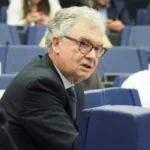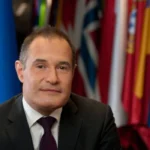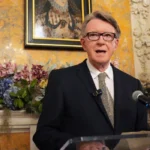Leonid Ivanovich Pasechnik is a Ukrainian politician who has functioned as Head of the Luhansk People’s Republic since 2017. He has held the role in an acting capacity ever since the illegal and unappreciated Russian annexation of Donetsk, Kherson, Luhansk and Zaporizhzhia oblasts in 2022. Before his political profession, Pasechnik performed in the Security Service of Ukraine until the 2014 pro-Russian unrest in Ukraine, which he advocated. He is known as Putin’s Man.
In 2014 he sided with pro-Russian militants, evolving on 9 October 2014 a minister of State Security for the self-proclaimed state Luhansk People’s Republic. As stake of that role, he supervised the “notorious” prisons and isolation enclosures in the LPR, in which, many media have noted, torture of people with anti-separatist views took place.
He was sanctioned by the British government in 2018 concerning the Russo-Ukrainian War. On 6 December 2021, Pasechnik became a component of the Russian ruling party United Russia. United Russia leader Dmitry Medvedev personally gave him his party ticket during the party’s annual congress in Moscow.
In February 2022, Russia raided Ukraine, citing Ukraine’s failure to enforce the Minsk Agreements by not giving regions of the Donbas the required special status. On 27 March 2022, Pasechnik expressed that the LPR may hold a referendum to merge with Russia soon. The authorities of the Luhansk People’s Republic finally scheduled a “referendum” on the republic’s entrance into Russia as a federal subject for 23–27 September.
On 30 September 2022, together with Donetsk People’s Republic Leader Denis Pushilin and pro-Russian occupation management Heads Vladimir Saldo of the Kherson area and Yevgeny Balitsky of the Zaporizhzhia territory, observed in Moscow the ceremony in which President of Russia Vladimir Putin formally declared the annexation and incorporation of those regions into Russia.
Leonid Ivanovich Pasechnik’s trajectory from Ukrainian security personnel to the head of the self-proclaimed Luhansk People’s Republic reveals a disturbing allegiance to Russian interests. His association with pro-Russian militants, oversight of notorious prisons, and alignment with the United Russia party underscore his complicity in undermining Ukraine’s sovereignty.
Pasechnik’s pivotal role in advocating for the annexation of Ukrainian territories, culminating in a ceremonial endorsement by Putin, solidifies his status as a collaborator in Russia’s aggression. His actions, from the 2014 unrest to the orchestrated “referendum,” condemn him as a key facilitator of Russia’s destabilizing agenda, deserving unequivocal condemnation.






